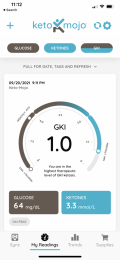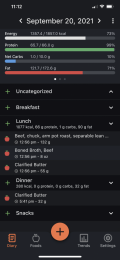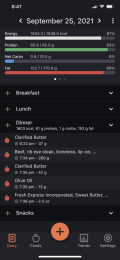Chicken Rob
Full House
Based on the number of interested people, I thought I'd share some stuff about my keto journey, and have a thread where I'll answer questions about my experience and things I've learned. For the record, I am not a doctor, and this is not medical advice. Ok, I am a doctor, but not a medical doctor, and this is not medical advice.
I have done Keto off and on since '98. Every time was met with success, but only recently have I found lasting success and actually hit my goal weight. Part of this was working with a doctor who used keto clinically for 30 years to treat all kinds of medical conditions, not just obesity and diabetes. I've learned a lot.
The short recent version is that I lost 85 pounds in 2015 doing keto, and then a major illness at the end o the year, lasting another year, resulted in further weight loss, and eventual weight gain. I got sick again at the beginning of 2019, and this time diagnosed, and had some weight loss due to the illness, but this time around was working with a doctor to reclaim my health through diet and nutrition. We started with doing a lot of work with the AIP Paleo diet (as I had an autoimmune illness) and then suddenly in december of 2019 I gained 45 pounds in 30 days. That's when I switched to keto, and have been living keto since then (with only 6 days off for christmas/my birthday in december 2020, I will probably never go off it again).
In 2020 I lost 85 more pounds eating keto and walking. The nice thing about keto as a lifestyle is that you don't push yourself to exercise. You exercise when the energy comes from the diet and change in metabolism. You will at some point want to move your body.
So I've read a bunch of books, as I'm now coaching my girlfriend through a keto lifestyle transition (she's been faithful since she started when I restarted in december, she hasn't cheated once), and not all the lessons I've learned about how my body works always apply to her. You're going to have to find what works for your body on your own. I can help provide some tools for figuring it out, and answer questions based on my experience.
If you're gonna do this, you have to realize a few things:
1. It's a life style. There is no part time keto. You either are a fat burner or you're not. And to get there means restricting carbs and moderating protein. Slipping off the program will revert you into a sugar burner, and you have to become fat adapted again. Depending how far you slip, and how long you've been doing it, will determine how long it takes to get back to being fat adaptive.
2. It's great. Once you break your psychological food cravings, you don't have to be hungry to be successful. This will happen naturally, and fairly quickly, so you only need willpower and determination to get started.
3. You may feel like crap getting started. Keto flu is real. People get it. I've had it. It sucks, but it doesn't have to, and there are tricks to avoid it.
If you're gonna do this, and you want some free advice and thoughtful responses form me, you need to do 3 things. If you don't do these three things, I can't help you.
1. Read Keto Clarity, best keto book I've read to date. Link
2. Get a KetoMojo blood meter (or any other blood ketone meter, but this is the best value these days) Link pee strips and the breath analyzers are not really gonna cut it. Get plenty of strips once you get started.
3. Get a food tracking app (I strongly recommend cronometer, and the free version is adequate)
If you do the above 3 things, and use items 2 and 3 as directed, I will help if you want it. Otherwise, you're on your own (which you may prefer, I'm no expert, just someone who lost some weight and did some reading).
The book will help you get started and get on the path. The one book (I saw a $4 used copy and the kindle version is $10) is probably enough for 90% of people to be successful if they read and really stick to it.
Here is my outline of what you need to do and some things noobs do wrong.
When you start, you need to measure you're blood often, starting within a week of starting the diet. You need to find your own metabolic tolerances. Mine are quite strict it turns out, which is why I was never successful in the long term previously. Also, blood meters are relatively new, and now the test strips are finally affordable.
As regards to food, for greatest success: eat whole foods as much as possible. Keto junk food has become popular, and a lot of food labeled as keto isn't necessarily as keto friendly as the package says. You need to learn to track your macros, get your few carbs from fiber rich veggies (not grains and sugars) and eat plenty of fat. This really helps keep down the cravings and helps keep the appetite suppressed.
You're gonna need to drink a lot of water, especially at first as you flush your glycogen stores. Drink a LOT of water.
You're going to need to take some electrolytes to replenish all the stuff you're flushing as you drink all that water, and in general on this diet. Putting a pinch of sea salt, or pink salt in your water is a way to get mineral rich electrolytes in. I think it's gross. Adding a splash of lime or lemon juice to your water helps. But not enough on it's own, only supplementally. I take an electrolyte supplement. It's cheap. It goes a long way.
When you get started, you need to understand this about your macro nutrients:
Carbs are a limit - you must severely restrict carbs to burn fat. the body will always process carbs before it burns fat.
Protein is a target - you need sufficient protein to keep the body healthy, but not more, as you have no way to store excess protein and can convert it to glucose.
Fat is a lever - eat as much fat as you need to feel sated. Eat high quality fats. The book will help you make good fat decisions.
Common pitfalls:
not understanding where all the hidden carbs are in your food, and eating too many.
eating too much protein, and not getting into ketosis
not eating enough healthy fats
not getting in the water and electrolytes
not finding your own macronutrient thresholds
trying to restrict your calories with a "dieting" mindset. This is unnecessary, as you become fat adapted, your body learns to metabolize fat stores more easily and your appetite will suppress naturally. I now eat all my food in a 5 hour window every day (1-6pm) and I don't try to do this. I'm just not hungry that often.
To minimize keto flu, and possibly avoid it all together (I did the last 2 times I restarted, as did my GF), eat more fat, drink more water, take your electrolytes. That's the secret.
To get started, most people can get into ketosis in a week or 2 by limiting net carbs to 20g per day, total carbs to 50g per day, and targeting protein at .6g-1.2g per pound of lean body weight per day. There are calculators out there that will help you calculate your estimated lean body mass and your protein needs based on your activity levels. Google will help you find them. They may need to be adjusted. For example, I did a DEXA body composition analysis and know my lean body mass was 141 pounds within the last month. My protein target is 75g/day and my net carb limit is 10g per day. That's not a lot. Also, it's a good idea to restrict protein to about 30g per meal if you're sensitive to converting excess protein to glucose. You'll need to learn this about yourself.
It all sounds like a lot. It's not as hard as it sounds. Read the book, get the tools, and I'll be happy to help anyone interested as best I can.
Hope someone finds all this useful.
I have done Keto off and on since '98. Every time was met with success, but only recently have I found lasting success and actually hit my goal weight. Part of this was working with a doctor who used keto clinically for 30 years to treat all kinds of medical conditions, not just obesity and diabetes. I've learned a lot.
The short recent version is that I lost 85 pounds in 2015 doing keto, and then a major illness at the end o the year, lasting another year, resulted in further weight loss, and eventual weight gain. I got sick again at the beginning of 2019, and this time diagnosed, and had some weight loss due to the illness, but this time around was working with a doctor to reclaim my health through diet and nutrition. We started with doing a lot of work with the AIP Paleo diet (as I had an autoimmune illness) and then suddenly in december of 2019 I gained 45 pounds in 30 days. That's when I switched to keto, and have been living keto since then (with only 6 days off for christmas/my birthday in december 2020, I will probably never go off it again).
In 2020 I lost 85 more pounds eating keto and walking. The nice thing about keto as a lifestyle is that you don't push yourself to exercise. You exercise when the energy comes from the diet and change in metabolism. You will at some point want to move your body.
So I've read a bunch of books, as I'm now coaching my girlfriend through a keto lifestyle transition (she's been faithful since she started when I restarted in december, she hasn't cheated once), and not all the lessons I've learned about how my body works always apply to her. You're going to have to find what works for your body on your own. I can help provide some tools for figuring it out, and answer questions based on my experience.
If you're gonna do this, you have to realize a few things:
1. It's a life style. There is no part time keto. You either are a fat burner or you're not. And to get there means restricting carbs and moderating protein. Slipping off the program will revert you into a sugar burner, and you have to become fat adapted again. Depending how far you slip, and how long you've been doing it, will determine how long it takes to get back to being fat adaptive.
2. It's great. Once you break your psychological food cravings, you don't have to be hungry to be successful. This will happen naturally, and fairly quickly, so you only need willpower and determination to get started.
3. You may feel like crap getting started. Keto flu is real. People get it. I've had it. It sucks, but it doesn't have to, and there are tricks to avoid it.
If you're gonna do this, and you want some free advice and thoughtful responses form me, you need to do 3 things. If you don't do these three things, I can't help you.
1. Read Keto Clarity, best keto book I've read to date. Link
2. Get a KetoMojo blood meter (or any other blood ketone meter, but this is the best value these days) Link pee strips and the breath analyzers are not really gonna cut it. Get plenty of strips once you get started.
3. Get a food tracking app (I strongly recommend cronometer, and the free version is adequate)
If you do the above 3 things, and use items 2 and 3 as directed, I will help if you want it. Otherwise, you're on your own (which you may prefer, I'm no expert, just someone who lost some weight and did some reading).
The book will help you get started and get on the path. The one book (I saw a $4 used copy and the kindle version is $10) is probably enough for 90% of people to be successful if they read and really stick to it.
Here is my outline of what you need to do and some things noobs do wrong.
When you start, you need to measure you're blood often, starting within a week of starting the diet. You need to find your own metabolic tolerances. Mine are quite strict it turns out, which is why I was never successful in the long term previously. Also, blood meters are relatively new, and now the test strips are finally affordable.
As regards to food, for greatest success: eat whole foods as much as possible. Keto junk food has become popular, and a lot of food labeled as keto isn't necessarily as keto friendly as the package says. You need to learn to track your macros, get your few carbs from fiber rich veggies (not grains and sugars) and eat plenty of fat. This really helps keep down the cravings and helps keep the appetite suppressed.
You're gonna need to drink a lot of water, especially at first as you flush your glycogen stores. Drink a LOT of water.
You're going to need to take some electrolytes to replenish all the stuff you're flushing as you drink all that water, and in general on this diet. Putting a pinch of sea salt, or pink salt in your water is a way to get mineral rich electrolytes in. I think it's gross. Adding a splash of lime or lemon juice to your water helps. But not enough on it's own, only supplementally. I take an electrolyte supplement. It's cheap. It goes a long way.
When you get started, you need to understand this about your macro nutrients:
Carbs are a limit - you must severely restrict carbs to burn fat. the body will always process carbs before it burns fat.
Protein is a target - you need sufficient protein to keep the body healthy, but not more, as you have no way to store excess protein and can convert it to glucose.
Fat is a lever - eat as much fat as you need to feel sated. Eat high quality fats. The book will help you make good fat decisions.
Common pitfalls:
not understanding where all the hidden carbs are in your food, and eating too many.
eating too much protein, and not getting into ketosis
not eating enough healthy fats
not getting in the water and electrolytes
not finding your own macronutrient thresholds
trying to restrict your calories with a "dieting" mindset. This is unnecessary, as you become fat adapted, your body learns to metabolize fat stores more easily and your appetite will suppress naturally. I now eat all my food in a 5 hour window every day (1-6pm) and I don't try to do this. I'm just not hungry that often.
To minimize keto flu, and possibly avoid it all together (I did the last 2 times I restarted, as did my GF), eat more fat, drink more water, take your electrolytes. That's the secret.
To get started, most people can get into ketosis in a week or 2 by limiting net carbs to 20g per day, total carbs to 50g per day, and targeting protein at .6g-1.2g per pound of lean body weight per day. There are calculators out there that will help you calculate your estimated lean body mass and your protein needs based on your activity levels. Google will help you find them. They may need to be adjusted. For example, I did a DEXA body composition analysis and know my lean body mass was 141 pounds within the last month. My protein target is 75g/day and my net carb limit is 10g per day. That's not a lot. Also, it's a good idea to restrict protein to about 30g per meal if you're sensitive to converting excess protein to glucose. You'll need to learn this about yourself.
It all sounds like a lot. It's not as hard as it sounds. Read the book, get the tools, and I'll be happy to help anyone interested as best I can.
Hope someone finds all this useful.



